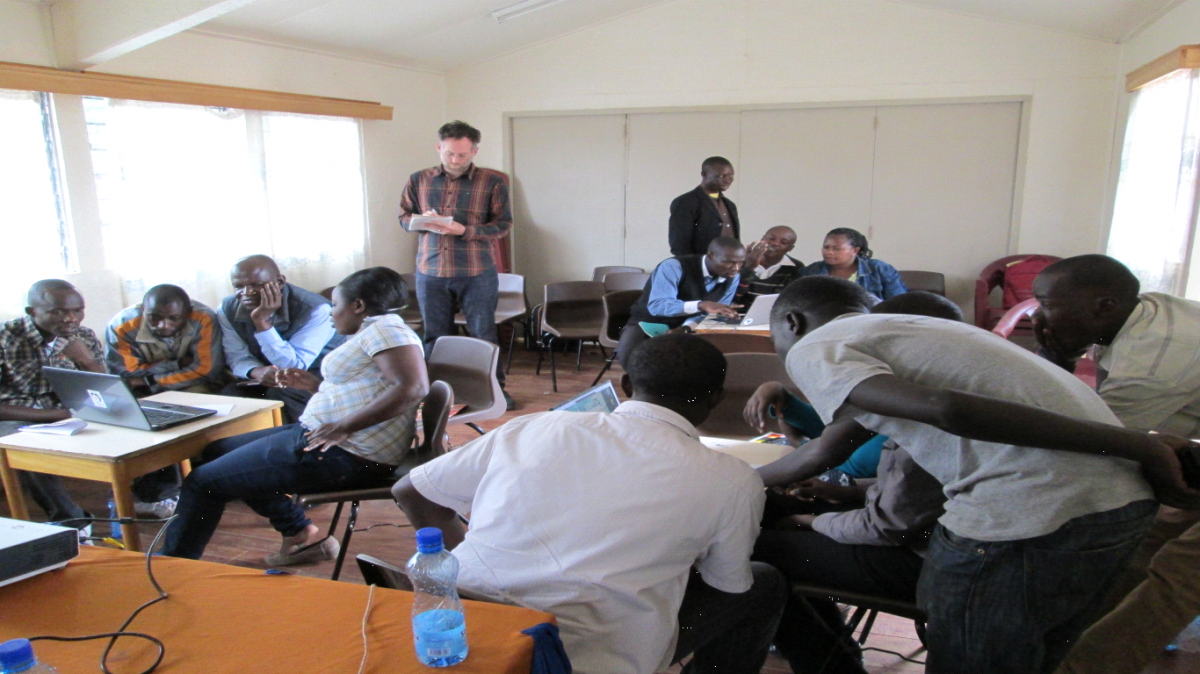A Kibera Diary post by Map Kibera team leader, Joshua Ogure
In April 2014, my colleague Steve and I conducted a pre- project survey in Kibera, talking to parents, teachers and school heads. This was meant to find out the missing gaps on education information, and what their thoughts were on Map Kibera Trust, GroundTruth and other partners trying to make education information easily available, accessible and useful to everybody.
This was important to know before the actual project could kick off. Kibera people know exactly what they want, and no one can impose anything on them against their will. There is something that anybody who wants to do any project not only in Kibera but also other informal settlements must always observe: that you must involve the people, I mean the stakeholders at a really early stage. If you want your project to succeed, let it be a people-driven idea.
Meeting with Officials, School Leaders and Teachers
One of the Map Kibera founders, Mr. Mikel Maron, was travelling to Nairobi in June 2014, and there was a need for him to meet and engage with all the relevant stakeholders and authorities. I was to arrange and schedule for all these meetings, and so the planning began.
We began by meeting the Chief, the Assistant County Commissioner, and the Langata District Education Officer (DEO). The reason was to explain to them what our education project was all about, and what exactly we intended to do in the process and how it would be helpful to the community, as well as to seek for their support/approval/permission. This was also a sign of respect to them, by informing them prior about what was to happen in their localities. The approvals and interest shown by the authorities really gave us more courage and confidence to proceed with the project.
This was immediately followed by the stakeholder’s forum for School Heads and teachers, whose contacts we had gathered during the pre-survey interviews. We held our first meeting on June 6 inside the famous Mchanganyiko hall. Out of the 15 teachers and school heads we invited 10 of them turned up. The criteria to select the 15 was tricky, but all we wanted was to have at least every village of Kibera represented plus a few extra that had raised concerns during the pre-survey exercise.
According to the responsibilities delegated to the six Map Kibera team members that were present, Zack Wambua was at the door to take care of the registration, Douglas Namale was taking the notes, Maurine Owino was to introduce the project and present the website, Steve Banner was behind the camera to document the forum, I was to pick up from Maurine and lead the feedback session while Mikel was on standby to oversee and tackle any hard question that could arise from the audience.
As usual here, people arrived one hour late after the scheduled time. I could see my friend from Washington DC (Mikel) was not comfortable as he had another meeting to attend after this, but what could he do? This is Kibera, this is Nairobi, this is Kenya, and this is Africa, we’ve been meant to believe that lateness is a culture here. Do not ask me who said, because I don’t know.
Emerging Issues
So what were some of the concerns as far as the whole project was concerned?
School heads wanted Map Kibera to consider the governance capacity of schools to handle feedback, or have a team that will keep monitoring the sites. There was a general agreement that constructive feedback can help schools to run better but schools are sensitive, some information can lead to loss of students/teachers or cause closure, leaving schools vulnerable to troublesome individuals.
Teachers also argued that freely commenting on the school website can just lead to junk and that it needed some editorial — they thought schools should have the right to verify information. Some people could use the platform to tarnish a school’s name when for instance they have a personal grudge with the Director of that particular school.
“What are ways of addressing ethical issues on the site? What are the official channels?” one teacher asked. However, the information is out there anyway – in social media, word of mouth, etc. This platform gives an opportunity to address it. Though we all agreed that there was a need for investigation process on serious cases in order to remain factual.
Generally, teachers were positive about the online educational directory. They saw it as a big opportunity on awareness of what is happening at other schools, and they felt that typing on the site would enable them to market or advertise themselves or perhaps use the website to fundraise for their schools, and also for parents to make informed choices.
Teachers also emphasized that there was a need to have more information on the particular curriculum followed at each school, performance and test results, extracurricular activities, special needs programs offered, and the school governance structure.
“A good project, just a few adjustments here and there and we are good, it will help,” one teacher whispered to his colleague on their way out.
